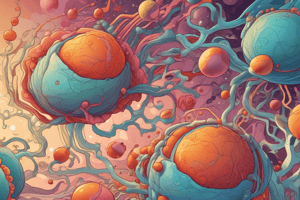Podcast
Questions and Answers
What are the two main types of processes in metabolism?
What are the two main types of processes in metabolism?
- Digestion and Absorption
- Catabolism and Anabolism (correct)
- Photosynthesis and Respiration
- Oxidation and Reduction
What is an example of a catabolic process?
What is an example of a catabolic process?
- Breakdown of glucose during cellular respiration (correct)
- Replication of DNA
- Formation of glucose during photosynthesis
- Synthesis of proteins
Which process is characterized by the synthesis of complex molecules from simple molecules?
Which process is characterized by the synthesis of complex molecules from simple molecules?
- Digestion
- Anabolism (correct)
- Photosynthesis
- Catabolism
Which of the following statements about enzymes is true?
Which of the following statements about enzymes is true?
Which form of metabolism releases energy?
Which form of metabolism releases energy?
What type of macromolecules are most enzymes made of?
What type of macromolecules are most enzymes made of?
Flashcards are hidden until you start studying
Study Notes
Metabolism
- Metabolism is the umbrella term for all chemical reactions occurring in a living organism
- These processes involve converting food into energy in the form of ATP and forming biomolecules like carbohydrates, proteins, lipids, and nucleic acids
- Metabolism has two main branches: catabolism and anabolism
Catabolism
- Catabolism is the breakdown of complex substances into simpler ones, releasing energy in the process
- Example: breaking down glucose during cellular respiration to generate energy
- Chemical reaction: A (substrate) -> B + C (products)
Anabolism
- Anabolism is the synthesis of complex molecules from simpler ones, using or absorbing energy
- Example: forming glucose during photosynthesis
- Chemical reaction: A + B (substrate) -> C (product)
Enzymes
- Biochemical reactions occur at a high rate in cells to maintain living processes
- Enzymes are responsible for speeding up these reactions
- An enzyme is an organic catalyst, mostly made up of proteins, produced by living cells
- Note: not all enzymes are synthesized from proteins
- Substances required for the reaction are called substrates
Studying That Suits You
Use AI to generate personalized quizzes and flashcards to suit your learning preferences.




